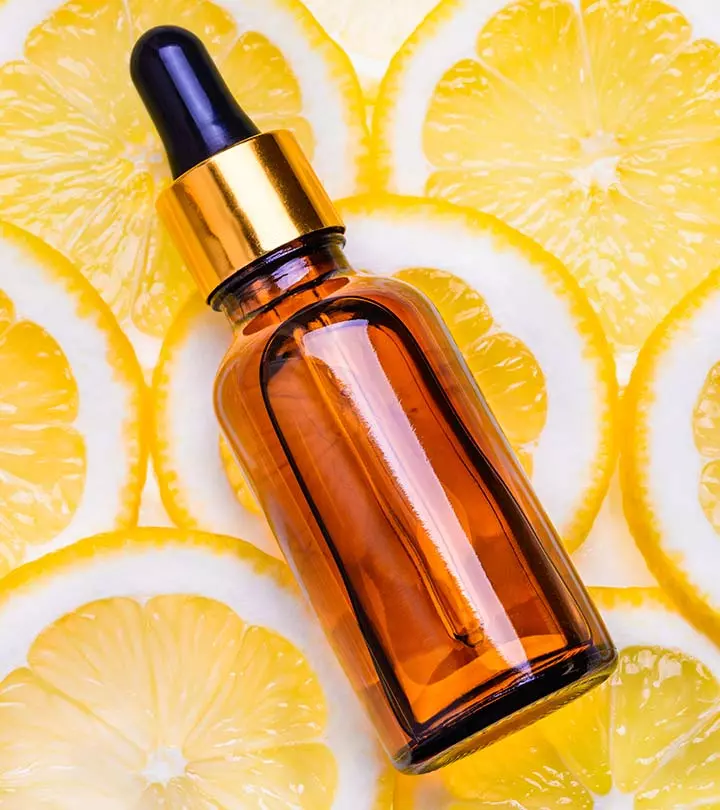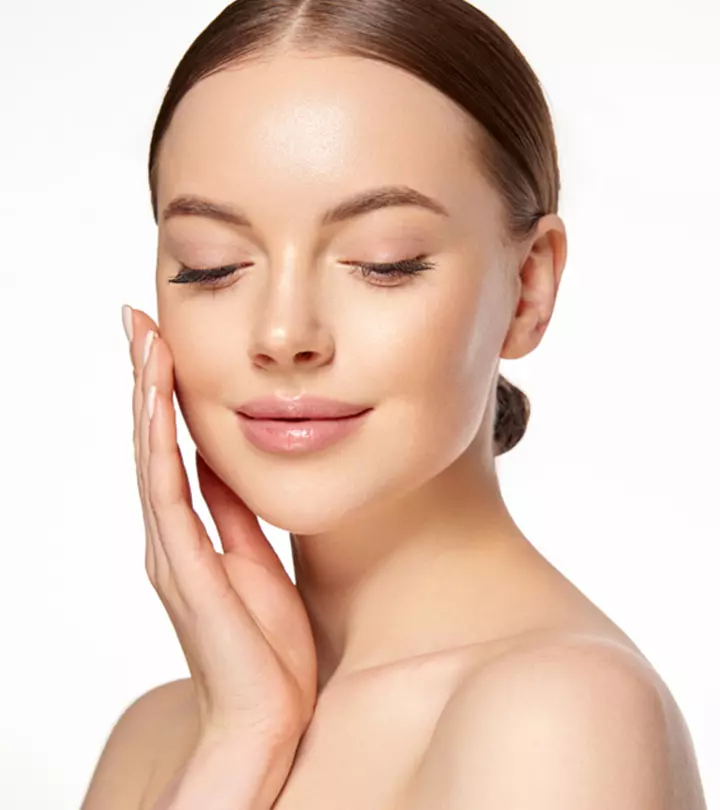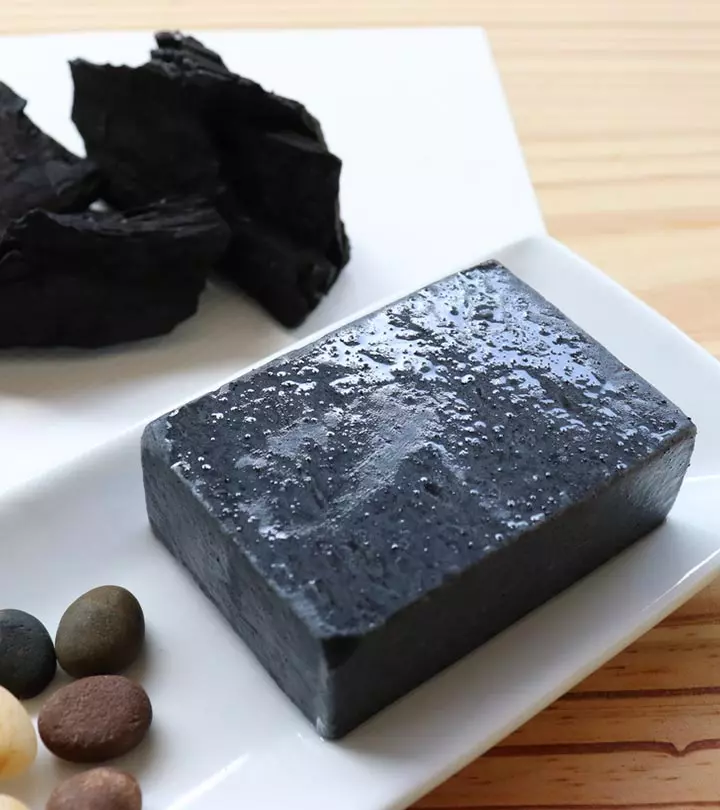Hyaluronic Acid And Vitamin C: 4 Expert Tips For Safe Use
When used correctly, this moisturizing combination can protect the skin against damage.

Image: Shutterstock
If you check the ingredients list on your skin care products, you should remember reading the names hyaluronic acid (HA) and vitamin C. They are commonly paired together because of their anti-aging benefits. Hyaluronic acid hydrates and moisturizes the skin, while vitamin C protects the skin with its antioxidant role. Keep scrolling down to know more about why these two ingredients are so popular in the skin care biz. Learn about all the benefits they can provide to your skin and how you can use them effectively.

In This Article
How Are Vitamin C And Hyaluronic Acid Good For Your Skin?
You have been taught the importance of vitamin C in a wholesome diet. You probably know how vital it is to keep your body’s natural defenses strong. However, did you know that it can also do wonders to your skin?
Vitamin C enhances the quality of your skin in two ways. Firstly, it stimulates the production of collagen. Secondly, it protects the skin from sun damage (1). Moreover, vitamin C also has the best antioxidant properties. It can neutralize the oxidants found in pollutants and protect your skin from free radical damage (1).
Vitamin C also helps reduce the premature signs of skin aging. It protects your skin from harmful UV rays (2). It also exfoliates your skin and eases any inflammation caused by acne.
Hyaluronic acid is a sugar your body produces naturally. It is found in the skin, eyes, and connective tissues. It is a humectant (aids hydration) (3). Hyaluronic acid creates a barrier by sealing the moisture inside your skin and improves your overall skin texture.
Your skin loses moisture as it ages. Hyaluronic helps maintain the water balance and makes your skin soft and plump. Moreover, it also may help reduce fine lines and wrinkles (3).
Now that you know what vitamin C and hyaluronic acid can do to your skin, let us understand if you can use them together.
Key Takeaways
- Found in the skin, eyes, and connective tissue, hyaluronic acid is a sugar naturally produced by your body.
- It is safe to use hyaluronic acid with vitamin C.
- Before combining skincare products, understand the pH balance, decide whether water or oil goes first, allow each product to absorb, and find what works for you.
Can You Use Hyaluronic Acid And Vitamin C Together?

Yes, you can use the two ingredients together and enjoy the unique benefits they bring to your skin. Generally, two counter-active chemicals can cause skin reactions. But you can rest assured with vitamin C and hyaluronic acid. They are effective together and are often used in several beauty products.
While using Vitamin C for the skin will protect your face from damage and rejuvenate it by stimulating collagen production, hyaluronic acid will make it plump and soft. When you follow any beauty regime, the sequence of the products used is crucial to reap the maximum benefits. You may also use vitamin C and hyaluronic acid separately. If that is the case, which product should be used first?
What Should You Apply First: Hyaluronic Acid Or Vitamin C?

HA starts disintegrating in mixtures that have a pH level of less than 4 and more than 11 (4). On the other hand, the pH level of vitamin C should be less than 3.5 for getting absorbed into the skin properly (5).
Both these ingredients/products must be used after the toner. The golden rule is to use the thinnest product first and the thickest one last. You can apply vitamin C first, wait for a minute or two so it absorbs completely into the skin, then move on to hyaluronic acid to lock in the hydration and keep the skin plump. However, leave a gap of a few minutes to allow vitamin C to penetrate your skin.
Since vitamin C is lighter and has a lower pH, it will quickly get absorbed into your skin (5). Applying hyaluronic acid afterward vitamin C will create a barrier (6). Moreover, vitamin C may dry your skin. Applying HA afterward will help restore skin moisture.
HA is available in a variety of products on the market. A cream-based formula will work wonderfully for dry and normal skin types, while a water-based product will deliver better results for combination or oily skin types.
While these ingredients can boost your skin health, using them right can multiply the benefits.
How Often Should You Use Hyaluronic Acid With Vitamin C To Improve Your Skin?

It is advisable to go slow while trying a new product on your face. Your skin could be sensitive to active ingredients like vitamin C and hyaluronic acid. In the beginning, use these serums on two different days a week and buffer them between your toner and moisturizer. You can preferably follow this regimen before bedtime (to better understand if your skin is sensitive to any of these products).
If everything goes well, you can start layering hyaluronic acid and vitamin c serum together. The trick is to build these products into your skincare regime gradually before you start using them consistently in the mornings and nights.
As for the dosage, less is always more with such active ingredients. A pea-sized amount should ideally be enough for your face. Using more will not give you any better results. Take the product on your fingers and apply it evenly to your face.
Let us now check a quick DIY vitamin C serum with a hyaluronic acid recipe.
DIY Hyaluronic Acid And Vitamin C Recipe

If you want to use a single product containing these two potent ingredients sans other irritants, this quick DIY vitamin C serum with hyaluronic acid recipe can help. This recipe is a lot more cost-effective than one available on the market.
This recipe works because water has a pH of 7, and it will keep the HA stable. You need not worry if hyaluronic acid would lose its potency after a while. Also, while making your own serum, it is advisable to stick to a vitamin C concentration of 10 to 20% as anything more can be too harsh on your skin. The MAP powder (the vitamin C) used in this recipe is stable and gets easily absorbed into the skin (7).
Ingredients
- 2 teaspoons of hyaluronic acid serum
- 3/4 teaspoon of magnesium ascorbyl phosphate (MAP) powder
- 1 tablespoon of aloe extract
- 2 tablespoons of distilled water
How To Make The Serum
- Take a dark-tinted bottle.
- Add all the ingredients into the bottle and shake it vigorously.
- Your serum is ready once the MAP powder has completely dissolved.
- Store the DIY serum in a cool, dark place to preserve the potency of the ingredients.
- Use it within 2 weeks for best results.
 Quick Tip
Quick TipAine, a YouTuber, shared her experience with hyaluronic acid-based skincare products, testing three different ones. In the video, she said, “I have thoroughly tested out hyaluronic acid in three different forms. I have tested it on damp skin and dry skin and I have given it quite a few weeks to work more to my skin’s detriment but it doesn’t seem to work for me (i).”
Another YouTuber, Mawen Mendoza, shared her 10-day experience of incorporating Vitamin C into her skincare routine. She documented her daily progress, addressing initial tingling, redness, and skin irritation. In the video, she said, “My skin just looks so much better, brighter, my hyperpigmentation is not fully gone but it did go down a lot, and my dark spots are fading like crazy. My skin just feels amazing. I just feel like a whole new woman, I feel more confident wearing no makeup even though I barely wear makeup these days (ii).”
Although you can use vitamin C and HA in combination, you need to be cautious while combining two active ingredients. Let us see a few general rules you are recommended to follow.
What Are The Rules For Combining Skin Care Products?
If you are concerned about using different products together, here are a few rules you can follow.
1. Understand The pH Balance

With an understanding of the pH balance of your skin and the active ingredients, you can avoid committing any cardinal mistakes while combining two potent compounds. The natural pH balance of your skin is around 4.7 and 5.7, making it slightly acidic.
Using pH-balanced products will help maintain the pH level of your skin. In other words, any product that has a pH between 4 and 7 should be good for your skin. Also, it is recommended to use products at a similar pH level.
For instance, retinol or vitamin A derivatives have a pH over 5, while vitamin C is more acidic at 3.5. Hence, these two should not be used together.
2. Water And Oil: Decide Which One Goes First
What happens when you mix oil and water? Oil floats on water and creates a barrier. Similarly, an oil-based product will block the penetration of a water-based gel or lotion. Thus, always use the latter first and move on to oil-based products.
3. Allow Each Product To Absorb
When using vitamin C and hyaluronic acid, ensure you have a few minutes for your skincare regime. Let each of your products sit for at least 30 seconds before applying the next. This method will ensure better absorption.
4. Find What Works For you
Your skin is unique, and what works for your friend may not work for you. It is all about finding what gives you better results. You can consult a dermatologist and see what would work best for you.
 Quick Tip
Quick TipInfographic: Tips For Using Hyaluronic Acid And Vitamin C
Hyaluronic acid and vitamin C improve your skin health in many ways. When paired together, they are an unbeatable duo. However, it is important to learn how to use them properly to avoid any side effects. Check out the infographic below for important tips to follow when using hyaluronic acid and vitamin C.
Some thing wrong with infographic shortcode. please verify shortcode syntaxIt’s important to know how to hydrate your skin effectively, naturally, and with a combination of skincare products. Including hyaluronic acid and vitamin C in your skin care routine can help your skin look and feel younger. This potent combination can refresh your skin, aid skin brightening, improve elasticity, and minimize fine lines and wrinkles. This combo also minimizes the harmful effects of UV rays. Start incorporating these ingredients into your skin care routine right away, and you will see the difference! Although hyaluronic acid and vitamin C can be used together, you must exercise caution when combining two active substances. If you are worried about mixing products, stick to the guidelines listed in the article.
Frequently Asked Questions
Can hyaluronic acid be used by people with sensitive skin?
Polina Sheriff, a cosmetologist, says, “Hyaluronic acid can actually be beneficial for people with sensitive skin. It occurs naturally in the skin and helps retain moisture. Try products with high molecular weight hyaluronic acid to help minimize irritation.”
How long do the effects of hyaluronic acid last?
Sheriff says, “The effects of hyaluronic acid are temporary, providing hydration for up to 24 hours – your skin type and environment will affect this.”
What are the benefits of using hyaluronic acid and vitamin C together in skin care?
“Combining hyaluronic acid with vitamin C can increase hydration and brightening effects. Hyaluronic acid attracts moisture and vitamin C helps to even skin tone by inhibiting melanin production.”, says Sheriff.
What can you not mix with hyaluronic acid?
Hyaluronic acid is a hydrating ingredient that goes with most skincare ingredients like retinol to give smooth and healthy skin. Consult a dermatologist to understand the different combinations beneficial for your skin.
Which is better: hyaluronic acid or niacinamide?
Both ingredients serve different purposes. Hyaluronic acid is best for skin hydration. Niacinamide is a derivative of vitamin B3 that helps build keratin, a protein essential for firm and smooth skin (10).
Is vitamin C better in the morning or at night?
You can use vitamin C at night before going to sleep to boost collagen production and let your skin repair itself (1).
Can I use niacinamide with hyaluronic acid, vitamin C, and retinol?
Yes, you can use niacinamide with hyaluronic acid, vitamin C, and retinol to keep your skin hydrated from the drying effects of retinol. Ideally, you should pair vitamin C with hyaluronic acid and niacinamide with hyaluronic acid and retinol to get visible results. Ensure that you start off slowly and see what products work for you.
Learn how to use vitamin C serum and hyaluronic acid together to achieve glowing skin from an expert dermatologist! Get the best tips and tricks from this helpful video to get beautiful, healthy skin.
Personal Experience: Source
StyleCraze's articles are interwoven with authentic personal narratives that provide depth and resonance to our content. Below are the sources of the personal accounts referenced in this article.
i. Hyaluronic Acid, My Experiencehttps://www.youtube.com/watch?v=Uem1RmefpAE
ii. adding VITAMIN C serum to my skincare routine for 10 days | Vichy LiftActiv before & after
https://www.youtube.com/watch?v=2FcyqV6y5WQ
References
Articles on StyleCraze are backed by verified information from peer-reviewed and academic research papers, reputed organizations, research institutions, and medical associations to ensure accuracy and relevance. Read our editorial policy to learn more.
- The Roles of Vitamin C in Skin Health.
https://www.ncbi.nlm.nih.gov/pmc/articles/PMC5579659/ - Double-blind, half-face study comparing topical vitamin C and vehicle for rejuvenation of photodamage.
https://pubmed.ncbi.nlm.nih.gov/11896774/
- Efficacy of a New Topical Nano-hyaluronic Acid in Humans.
https://www.ncbi.nlm.nih.gov/pmc/articles/PMC3970829/ - Effect of pH on the Behavior of Hyaluronic Acid in Dilute and Semidilute Aqueous Solutions.
https://www.researchgate.net/publication/229869826_Effect_of_pH_on_the_Behavior_of_Hyaluronic_Acid_in_Dilute_and_Semidilute_Aqueous_Solutions
- Topical L-ascorbic acid: percutaneous absorption studies.
https://pubmed.ncbi.nlm.nih.gov/11207686/ - A review of protection against exposome factors impacting facial skin barrier function with 89% mineralizing thermal water.
https://pubmed.ncbi.nlm.nih.gov/30964240/
- Vitamin C in dermatology.
https://www.ncbi.nlm.nih.gov/pmc/articles/PMC3673383/ - Retinoids in the treatment of skin aging: an overview of clinical efficacy and safety
https://www.ncbi.nlm.nih.gov/pmc/articles/PMC2699641/ - Dual Effects of Alpha-Hydroxy Acids on the Skin
https://www.ncbi.nlm.nih.gov/pmc/articles/PMC6017965/ - Nicotinic acid/niacinamide and the skin
https://pubmed.ncbi.nlm.nih.gov/17147561/
Read full bio of Dr. M. Khawar Nazir
- Polina Sheriff is the Head Cosmetologist at Berlin Kosmetik, specializing in holistic beauty treatments. With a focus on personalized skin care, Polina addresses various skin concerns such as acne, aging, and scarring. She uses advanced techniques like enzymatic therapy and peels and prioritizes gentle care. Polina has 10+ years of experience and is dedicated to restoring confidence in her clients by enhancing their natural beauty through tailored treatments and professional care. She is a graduate of Freie Universität Berlin.
 Polina Sheriff is the Head Cosmetologist at Berlin Kosmetik, specializing in holistic beauty treatments. With a focus on personalized skin care, Polina addresses various skin concerns such as acne, aging, and scarring. She uses advanced techniques like enzymatic therapy and peels and prioritizes gentle care. Polina has 10+ years of experience and is dedicated to restoring confidence in her clients by enhancing their natural beauty through tailored treatments and professional care. She is a graduate of Freie Universität Berlin.
Polina Sheriff is the Head Cosmetologist at Berlin Kosmetik, specializing in holistic beauty treatments. With a focus on personalized skin care, Polina addresses various skin concerns such as acne, aging, and scarring. She uses advanced techniques like enzymatic therapy and peels and prioritizes gentle care. Polina has 10+ years of experience and is dedicated to restoring confidence in her clients by enhancing their natural beauty through tailored treatments and professional care. She is a graduate of Freie Universität Berlin.
Read full bio of Annie Jangam
Read full bio of Ramona Sinha
Read full bio of Medha Deb
























Community Experiences
Join the conversation and become a part of our empowering community! Share your stories, experiences, and insights to connect with other beauty, lifestyle, and health enthusiasts.